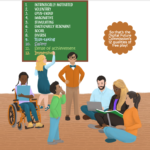This past week I ran across a short post written by educator Beth Holland for Edutopia, the newsletter of the George Lucas Educational Foundation. Her post—”How Much Screen Time? That’s the Wrong Question”—thrilled me. Seriously. I especially appreciated the title. Beth hit my personal mission to change how we relate to “screen time” AND she referenced a book that underpins a lot of my own work—The Triple Focus: A New Approach to Education, by Daniel Goleman and Peter Senge.
You may be familiar with Daniel Goleman from his work on emotional intelligence. Peter Senge has been a leader in systems thinking for decades. They are a powerful team of caring thought leaders with deep experience. Beth’s post is really geared towards teachers, but is easily translated for parents. Note: Beth confuses Senge and Goleman’s Other with Outer. But the points she makes are still valuable. Think of Beth’s ten-paragraph article as a teaser for the book The Triple Focus…
Goleman and Senge present what they describe as “three crucial skill sets for navigating a fast-paced world of increasing distraction and endangered person-to-person engagement…”
The first is INNER FOCUS.
“…focusing on ourselves—on our interior world, connecting with our sense of purpose and deepest aspirations, understanding why we feel the way we do and what to do about those feelings. Inner focus holds a key to a purposeful life, to concentrating on the task at hand, ignoring distractions, and managing our disturbing emotions.“
The second is OTHER FOCUS.
“…tuning in to other people, or empathizing, being able to understand another person’s reality and relating to him [her] from his [her] perspective, not just from our own. Such empathy leads to caring and to the ability to work together—keys to effective, connected relationships.”
The third is OUTER FOCUS.
“…understanding the larger world, the way systems interact and create webs of interdependence, whether this interaction is in a family or an organization, or the world at large. This understanding requires systems thinking, not just the simplistic “A causes B,” there-is-a-right-answer thinking of traditional education.”
I encourage you to get and read the book yourself. It’s deep and relevant for supporting families in developing mindful approaches to digital media.
How are you modeling these skills in your family in the context of Mindful Digital Life? Which of the three skills seems to be the most challenging for you right now? I’d love to hear from you. Reply to this email if you feel like sharing.

Next Up: In the Edutopia article, Beth references a post in Forbes by Jordan Shapiro, father of two boys and Senior Fellow at the Joan Ganz Cooney Center at Sesame Workshop. Shapiro wrote it in 2013 but I find it still very relevant, especially his exploration of styles of parental mediation and joint media engagement. I’ll dive into this in my next post.
Upcoming Talks and Presentations: I will be speaking on November 11 at Parenting U, presented by Julia Morgan School for Girls and SOS4Students. If you’re in the San Francisco Bay area, please consider attending.
Go Deeper? Here are a few links…
Systems Thinking in a Digital World This video is a talk by Peter Senge at the Heart-Mind 2015 education conference—the conference title was “Human Connection in a Digital World.” Peter’s talk focuses in particular on the skill of Outer Focus in the context of our complex relationship with technology. If you only have a few minutes, scroll forward to 38 minutes in the talk (it’s 41 minutes long) and watch the clip Peter shows of some young boys working with systems models. It’s quite a lovely demonstration of the Outer Focus (systems thinking) skill in action.
Facebook pages


